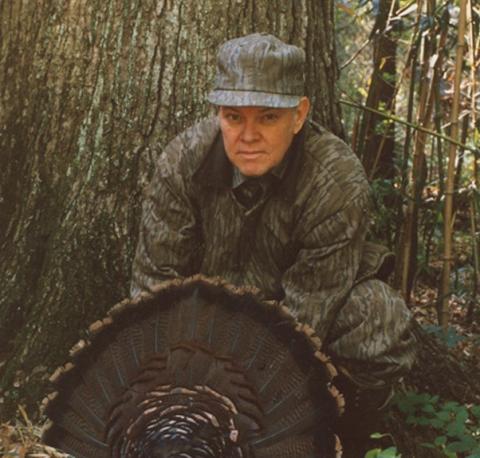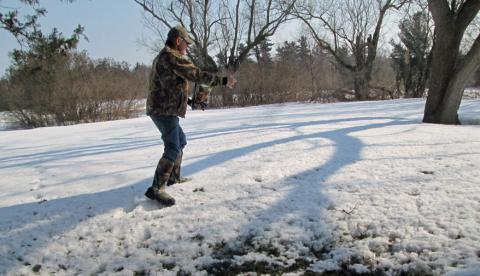Heath Wood
Turkey calls are essential tools for any serious hunter, but like any piece of equipment, they require proper care and storage to ensure they perform at their best season after season.
During a past spring turkey season in Missouri, one of my most trusted tools was a diaphragm call I had relied on for two years. While attending a turkey calling contest a few years prior, I met a custom call maker with a mouth call that perfectly suited my calling style. I loved the sounds I could produce with it, and it quickly became my go-to call. That spring, it helped me bring several gobblers into shooting range.
While hunting with my father the following season, I started the morning using my favorite call—until suddenly, the sound was gone. Upon closer inspection, I discovered the reeds had separated from the frame. My season was in jeopardy unless I could find a replacement.
Because it was a custom-made call, I couldn’t grab another one at the nearest Walmart. However, in true small-town southern Missouri fashion, I remembered an old gas station about twelve miles away that carried the brand I had been using. We made the trip, and lo and behold, there it was, hanging on a dust-covered shelf. Excitedly, I told the woman behind the counter, “I’ll take that call.” My season was saved—or so I thought.
As soon as I returned to the truck, I tore open the package, eager to try out my new call. But the moment I touched it, the latex crumbled in my lap—along with my hopes of finding a replacement. The call had been sitting on the shelf for so long that it had dry-rotted inside the packaging. My original call had failed, and now, so had my backup. To make matters worse, the call maker had since closed his shop, leaving me without an option to replace it.
That experience taught me a valuable lesson: Proper care and maintenance are essential for longevity and performance, whether you use diaphragm calls, pot calls, or box calls. Taking the time to store and maintain your calls will keep them producing crisp, realistic turkey sounds season after season, so you will never find yourself in a mid-season crisis like I did.
Turkey Mouth Call Maintenance and Storage

Diaphragm calls are popular for their versatility and hands-free operation, but they’re also the most susceptible to wear and tear. The latex reeds in these calls are sensitive to moisture, heat, and bacteria. Given the abuse one call experiences each season—soaking it in human saliva, throwing it on a truck dash, and so on—proper maintenance is crucial to ensure it lasts more than one or two seasons.
Cleaning and Storage Tips
- Rinse After Every Use: After each hunt, rinse your diaphragm call with cold water to remove saliva and debris. This prevents bacteria buildup, which can degrade and quickly break down the latex.
- Air Dry Thoroughly: Never store your call wet. Lay it on a clean paper towel and let it air dry before putting it away.
- Use a Call Separator: Many diaphragm calls have a small plastic separator or toothpick to keep the reeds from sticking together. If yours didn’t come with one, simply cut a small piece of plastic (like from a milk jug) and place it between the reeds when storing.
Refrigeration or Mouthwash?
There’s some debate about the best way to store diaphragm calls long-term. As a teenager living with my mom—and now as an adult with my wife—I’ve often heard complaints about my calls taking up space in the refrigerator. Some hunters swear by refrigeration, while others prefer using mouthwash. Having tried both methods, I’ve found that the calls I cleaned regularly and kept in the fridge lasted up to three years.
- Refrigeration: Storing diaphragm calls in the fridge (not the freezer) helps slow the breakdown of latex and keeps the reeds from drying out. Place them in a vented case or a container with a few holes to allow airflow.
- Mouthwash Soak: Soaking your diaphragm call in a non-alcoholic, antiseptic mouthwash for a few minutes helps kill bacteria and freshen the call. Be sure to rinse and dry it before storage. I have heard of hunters soaking calls to clean them, and it also gives them a good taste when used again. However, keeping them soaked in cleaner can also break them down quicker.
Regardless of your preferred method, always store diaphragm calls in a cool, dry place when not in use and replace them when they sound weak or the reeds become too soft. As a note, the gas station where I attempted to purchase my call was heated by an old-fashioned wood stove in the winter and had no air conditioning in the summer. That call had no chance of lasting on the shelf.
Turkey Pot Call Maintenance

Pot calls (slate, glass, or aluminum), although not as much as a diaphragm call, also require regular upkeep to maintain their crisp, realistic tones. Over time, the striking surface and striker tip can wear down, affecting sound quality, or in my case, they get broken when not correctly stored.
Conditioning the Striking Surface
- Slate Calls: Use a Scotch-Brite pad or fine steel wool to gently roughen the surface. Avoid using sandpaper on slate, as it can be too abrasive.
- Glass and Crystal Calls: To create texture on the surface, use 100-150 grit sandpaper or a conditioning stone. Move the sandpaper in small circular motions or straight strokes across the area you plan to strike.
- Aluminum Calls: Roughen the surface using a conditioning stone or coarse sandpaper (80-100 grit). Then, wipe off any debris.
Striker Maintenance
The striker is just as important as the call itself. You won’t get clean, consistent sounds if it is not maintained correctly.
- Wood Strikers: Lightly sand the tip with fine-grit sandpaper (220-400 grit) to remove dirt and smooth out wear.
- Carbon or Acrylic Strikers: Wipe them down with a dry cloth to remove dust and oils. Unlike wood, these materials don’t require sanding.
Storage Tips
- Keep pot calls in a protective case to prevent accidental damage.
- Store them in a dry environment to avoid moisture buildup, which can affect sound quality.
- Avoid touching the striking surface with oily hands, which can cause slippage when calling.
Box Call Maintenance

If not adequately maintained, box calls can sound like a sick donkey braying or like the high-pitched sound of fingernails on a chalkboard. The sound is crucial, yet box calls are also often prized for their rich, natural turkey sounds, which require routine care to keep them in top shape.
Chalking the Call
- Use high-quality box call chalk (never use sidewalk or oil-based chalk, as they can damage the wood).
- Apply a light, even coat to the underside of the lid and the edges of the call where they make contact.
- Avoid over-chalking, as too much buildup can cause inconsistent sounds. Wipe away excess with a dry cloth.
Tuning and General Maintenance
- Tighten or Loosen the Lid: If your call starts sounding off, adjust the screw that holds the lid to fine-tune the pitch and tone. Minor adjustments can make a big difference.
- Keep It Dry: Box calls are susceptible to moisture. Store them in a waterproof bag or case when hunting in damp conditions.
- Avoid Touching the Surfaces: The areas where wood meets (such as the underside of the lid and call edges) should remain free of oils and dirt. Lightly sand these areas with fine-grit sandpaper (220-400 grit) to restore sound quality.
Storage Tips
- Store box calls in a cool, dry place.
- Keep them in a padded case to prevent accidental damage.
- Never leave them in a hot vehicle; extreme temperatures can warp the wood.
Taking care of your turkey calls doesn’t have to be complicated, but regular maintenance is key to keeping them sounding great. A little extra effort will extend the life of your calls, ensuring they perform flawlessly when you need them most. Whether it’s keeping diaphragm calls in the fridge, conditioning your pot call surface, or tuning up a box call with fresh chalk, proper care will help you lure in that next big gobbler.






























